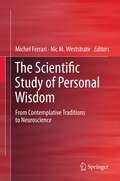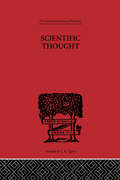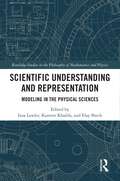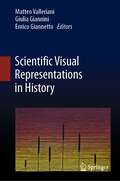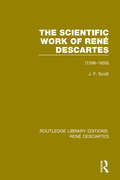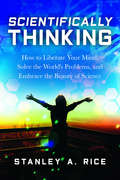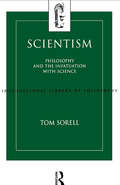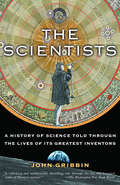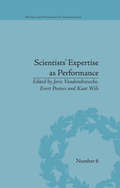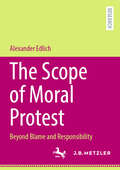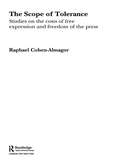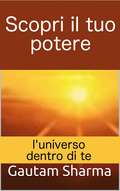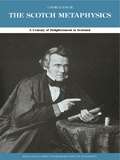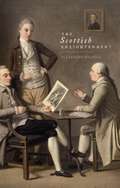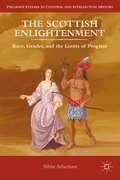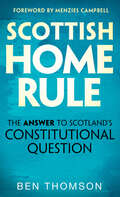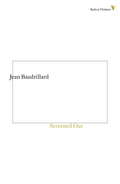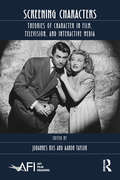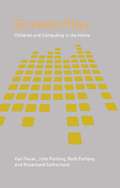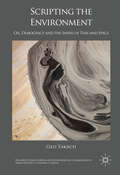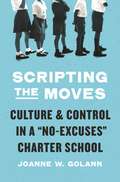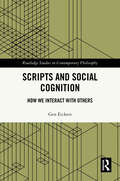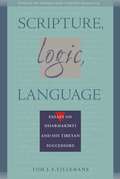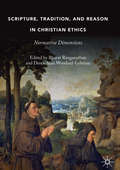- Table View
- List View
The Scientific Study of Personal Wisdom: From Contemplative Traditions to Neuroscience
by Michel Ferrari and Nicholas WeststrateThe rich and diverse contributions to this volume span a wide variety of disciplines, from psychology and philosophy to neuroscience, by some of the most influential scholars in the emerging science of personal wisdom. As such, it is a collection of essential readings and the first publication to integrate both the spiritual and pragmatic dimensions of personal wisdom.The content of the book goes beyond speculative theory to present a wealth of scientific research currently under way in this expanding field. It also describes numerous promising methods now being deployed in the quest for scientific knowledge of the elusive, yet critical, phenomenon of personal wisdom. The book is an excellent introduction to the field for novice researchers as well as a stimulating and enlightening resource for established experts. Its broad appeal makes it a vital addition to the libraries of academics and practitioners in many disciplines, from developmental psychology to gerontology, and from philosophy to contemplative religious traditions such as Buddhism.
Scientific Thought: A Philosophical Analysis of some of its fundamental concepts (International Library of Philosophy)
by C.D. BroadThis is Volume I of a series of six on the Philosophy of Science. Originally published in 1923, this study offers a philosophical analysis of some of science's fundamental concepts and is ultimately based on a course of lectures delivered to the third year students of science at the University of Bristol in the session 1920-21.
Scientific Understanding and Representation: Modeling in the Physical Sciences (Routledge Studies in the Philosophy of Mathematics and Physics)
by Insa Lawler Kareem Khalifa Elay ShechThis volume assembles cutting-edge scholarship on scientific understanding, scientific representation, and their delicate interplay. Featuring several articles in an engaging ‘critical conversation’ format, the volume integrates discussions about understanding and representation with perennial issues in the philosophy of science, including the nature of scientific knowledge, idealizations, scientific realism, scientific inference, and scientific progress.In the philosophy of science, questions of scientific understanding and scientific representation have only recently been put in dialogue with each other. The chapters advance these discussions from a variety of fresh perspectives. They range from case studies in physics, chemistry, and neuroscience to the representational challenges of machine learning models; from special forms of representation such as maps and topological models to the relation between understanding and explanation; and from the role of idealized representations to the role of representation and understanding in scientific progress.Scientific Understanding and Representation will appeal to scholars and advanced students working in philosophy of science, philosophy of physics, philosophy of mathematics, and epistemology.
Scientific Visual Representations in History
by Matteo Valleriani Enrico Giannetto Giulia GianniniThis book explores continuity and ruptures in the historical use of visual representations in science and related disciplines such as art history and anthropology. The book also considers more recent developments that attest to the unprecedented importance of scientific visualizations, such as video recordings, animations, simulations, graphs, and enhanced realities. The volume collects historical reflections concerned with the use of visual material, visualization, and vision in science from a historical perspective, ranging across multiple cultures from antiquity until present day. The focus is on visual representations such as drawings, prints, tables, mathematical symbols, photos, data visualizations, mapping processes, and (on a meta-level) visualizations of data extracted from historical sources to visually support the historical research itself. Continuity and ruptures between the past and present use of visual material are presented against the backdrop of the epistemic functions of visual material in science. The function of visual material is defined according to three major epistemic categories: exploration, transformation, and transmission of knowledge.
The Scientific Work of René Descartes: 1596-1650 (Routledge Library Editions: Rene Descartes)
by J. F. ScottWhen originally published in 1952, this book filled a gap in the history of philosophy and science and remains an important work today, because it puts the main mathematical and physical discoveries of Descartes in an accessible form, for the benefit of English readers. Descartes is acknowledged to be the founder of modern mathematics, through his invention of analytical geometry and this volume charts Descartes’ role in bringing a unity into algebra and geometry and the development of mathematics into a discipline which could be properly analysed. Carefully paraphrasing the Géométrie, this volume retains much of Descartes’ original notation as well as the original diagrams. The volume also discusses the considerable contribution that Descartes made to the physical sciences which involved accurate work in optics, light, sight and colour.
Scientifically Thinking: How to Liberate Your Mind, Solve the World's Problems, and Embrace the Beauty of Science
by Stanley A. RiceShows the many advantages of thinking like a scientist and argues that today's problems require a scientific approach.You don't have to be a scientist to think like a scientist. Anyone can do it and everyone should. This book will show you how. The advantages are many: from detecting bias to avoiding error and appreciating the richness of the world. Author Stanley Rice, himself a scientist, explains that science is essentially organized common sense. While the brain is hardwired for common sense, unfortunately, it also relies on a number of misleading tendencies. Instead of reasoning objectively it tends to rationalize. Often it sees what it wants to see rather than what is really there. And it is adept at both self-deception and deceiving others. Rice notes that these tendencies were useful in the past as the human race evolved in an often-hostile environment. But today bias and delusions put us at risk of worldwide catastrophe.The author invites readers to participate in the adventure of scientific discovery. He provides many interesting and humorous examples of how science works. He shows how hypothesis testing can be used to tackle everyday problems like car trouble or seeing through the specious appeal of a fad diet. Beyond practical applications, science meets the basic human need to satisfy curiosity: it tells verifiable stories about the universe, providing humans with fascinating narratives supported by testable facts. The author also explores some of science's biggest ideas, including natural selection (creating order out of randomness) and interconnectedness (Earth's systems are intricately intertwined). Read this book and learn to think like a scientist. It will guard you against being manipulated by politicians, corporations, and religious leaders, and equip you to deal with the world's most pressing problems. And you will have a lot of fun doing it.
Scientism: Philosophy and the Infatuation with Science (International Library of Philosophy)
by Tom SorellFirst Published in 2004. Routledge is an imprint of Taylor & Francis, an informa company.
The Scientists: A History of Science Told Through the Lives of Its Greatest Inventors (Britannica Guides)
by John GribbinA wonderfully readable account of scientific development over the past five hundred years, focusing on the lives and achievements of individual scientists, by the bestselling author of In Search of Schrödinger’s CatIn this ambitious new book, John Gribbin tells the stories of the people who have made science, and of the times in which they lived and worked. He begins with Copernicus, during the Renaissance, when science replaced mysticism as a means of explaining the workings of the world, and he continues through the centuries, creating an unbroken genealogy of not only the greatest but also the more obscure names of Western science, a dot-to-dot line linking amateur to genius, and accidental discovery to brilliant deduction.By focusing on the scientists themselves, Gribbin has written an anecdotal narrative enlivened with stories of personal drama, success and failure. A bestselling science writer with an international reputation, Gribbin is among the few authors who could even attempt a work of this magnitude. Praised as “a sequence of witty, information-packed tales” and “a terrific read” by The Times upon its recent British publication, The Scientists breathes new life into such venerable icons as Galileo, Isaac Newton, Albert Einstein and Linus Pauling, as well as lesser lights whose stories have been undeservedly neglected. Filled with pioneers, visionaries, eccentrics and madmen, this is the history of science as it has never been told before.
Scientists' Expertise as Performance: Between State and Society, 1860–1960 (History and Philosophy of Technoscience #6)
by Joris Vandendriessche Evert Peeters Kaat WilsThe essays in this collection explore our reliance on experts within a historical context and across a wide range of fields, including agriculture, engineering, health sciences and labour management. Contributors argue that experts were highly aware of their audiences and used performance to gain both scientific and popular support.
The Scope of Moral Protest: Beyond Blame and Responsibility
by Alexander EdlichThe book highlights a neglected aspect of our moral practices: we can morally protest objectionable conduct without blaming agents for it. In this way, moral responses to wrongful conduct are possible without assessing the blameworthiness of agents. The book offers an account of moral protest as a type of stance-taking: in protest, the protester commits themselves to treating what they protest as morally objectionable, which is related to a specific class of moral emotions. The aptness conditions of moral protest and the concept of objectionability are discussed and this perspective is applied to a critical discussion of the attributionist view of blameworthiness and corresponding views of blame. It concludes that our moral practices allow for more variation than is often acknowledged, some of which unrelated to moral responsibility, and that this gives us reason not to insist on a broad view of blameworthiness. Specifically, it is argued that the significance of morally objectionable conduct and the needs of victims of wrongdoing can be done justice to without blame. The book thus suggests that moral protest without blame may be called for more often than we think, including for many types of wrongdoers whose culpability is disputed.
The Scope of Tolerance: Studies on the Costs of Free Expression and Freedom of the Press (Extremism and Democracy #Vol. 7)
by Raphael Cohen-AlmagorOne of the dangers in any political system is that the principles that underlie and characterize it may, through their application, bring about its destruction. Liberal democracy is no exception. Moreover, because democracy is relatively a young phenomenon, it lacks experience in dealing with pitfalls involved in the working of the system - the ‘catch’ of democracy. This is an interdisciplinary study concerned with the limits of tolerance, this ‘democratic catch’, and the costs of freedom of expression. Rights are costly, and someone must pay for them. We can and should ask about the justification for bearing the costs, weighing them against the harms inflicted upon society as a result of a wide scope of tolerance. While recognizing that we have the need to express ourselves, we should also inquire about the justifications for tolerating the damaging speech and whether these are weighty enough. This book combines theory and practice, examining issues of contention from philosophical, legal and media perspectives and covers such issues as: media invasion into one’s privacy offensive speech incitement hate speech holocaust denial media coverage of terrorism. This book is essential reading for anyone who has research interests in political theory, extremism, and free speech.
Scopri il tuo potere: l'universo dentro di te
by Gautam SharmaLa consapevolezza dell'ego e la connessione al campo unificato. ...essere amati per se stessi ed essere apparentemente separati dal proprio stato originale di consapevolezza e dal campo unificato, ha proporzioni spirituali talmente profonde che, sin dalla prima infanzia si innescano dei processi in aree strategiche del cervello tali da provocare uno squilibrio e la dominanza, oltre alla negazione, alla sfiducia, al trascurare la nostra connessione al campo unificato e l'amore e la gioia e uno stato di consapevolezza spirituale ancora più profondo dentro di noi
The Scotch Metaphysics: A Century of Enlightenment in Scotland (Routledge Studies in Nineteenth-Century Philosophy #Vol. 1)
by George E. DavieFocusing on the works of Thomas Reid, Dugald Stewart, Sir William Hamilton, Thomas Brown and James Frederick Ferrier, this book offers a definitive account of an important philosophical movement, and represents a ground-breaking contribution to scholarship in the area. Essential reading for philosophers or anyone with an interest in the history of philosophical thought.
The Scottish Enlightenment: Essays In Reinterpretation (Rochester Studies In Philosophy Ser. #1)
by Alexander BroadieThis authoritative anthology covers the many contributions to science, philosophy and economics made by the great minds of 18th century Scotland. Through the eighteenth and into the nineteenth centuries, Scotland saw an explosion of intellectual activity in the realms of philosophy, law, economics, politics, linguistics and the physical sciences. Great thinkers such as Adam Smith, David Hume, Adam Ferguson, Thomas Reid, James Hutton, and many others formulated many of the ideas that would become foundational to modernity. This anthology collects some of the most significant works by Scottish Enlightenment thinkers as well as lesser-known writings that have not been reprinted for centuries. Arranged thematically, it includes sections on Human Nature, Ethics, Aesthetics, Religion, Economics, Social Theory and Politics, Law, Historiography, Language and Science. Scottish philosopher and intellectual historian Alexander Broadie sheds light on the significance of these writings through his masterful introduction as well as commentary throughout.&“A major contribution to our literature and intellectual resources and I do not think it could be better done . . . For many people this book will become a companion for years or even a lifetime.&” —Scotsman, UK
The Scottish Enlightenment
by Silvia SebastianiExamines how the difference between monogenist and polygenist accounts of the origin of the human race was reflected in, and helped to shape, Scottish Enlightenment accounts of society's progress through historical stages. Reveals how concepts of race and the role of women were treated by historians, philosophers, and other thinkers.
Scottish Home Rule: The Answer to Scotland's Constitutional Question
by Ben ThomsonA proponent of Scottish Home Rule offers a clear and concise introduction to the merits of the policy and the history of the movement. Every debate about the Scottish constitution should include the topic of Scottish Home Rule, and if there is to be another referendum in Scotland then Home Rule should be one of the options on the ballot paper. Yet, for all its importance, Home Rule is not widely understood. The proposal is seen by many Unionists as the slippery slope to Independence. Meanwhile, Independence supporters regard it as a Unionist proposal to retain sovereignty over Scotland. It is however a strong proposal in its own right, with a separate history from Independence and a more likely steppingstone to Federalism. This book lays out the merits of Scottish Home Rule as the best solution for Scotland. It covers the history of support for the Home Rule option since 1860s, a clear outline of how it works, and a discussion about how it could both improve Scotland and act as a framework for constitutional reform across the UK.
The Scottish State and European Migrants, 1885–1939: Managing Foreignness (Palgrave Studies in Migration History)
by Terence McBrideThis book examines the efforts of the government in Scotland to manage the increase of migrants travelling to Britain at the end of the nineteenth century. Focussing on the period between 1885 and 1939, the book explores how the Scottish machinery of government handled the administration of ‘foreigners.’ The author uses a comparative, thematic approach to analyse migrant experiences, identities, and relationships with state institutions. Drawing from state records held by the National Records of Scotland in Edinburgh, the book argues that Scottish officials in semi-autonomous boards began to recognise, describe and enumerate the presence of the ‘foreigner’ in the early twentieth century, framing their handling of foreignness in accordance with the Aliens Act of 1905. The author goes on to explain that institutions operating in Scotland developed a distinctly Scottish approach to alien matters, which continued up until the Second Word War. Therefore, an increasing number of importantdecisions affecting migrants were taken by a distinctly Scottish machinery of government, impacting on how Scottish officials understood foreignness, and how those identified as foreigners understood their identity in relation to Scottishness. Contributing significantly to current heated debates on migration and identity amongst researchers and the general public in Europe and beyond, this book provides essential insights into the ways in which a ‘sub-state’ began to develop practices, processes and attitudes towards migration which were not always in line with that of the central government.
Screened Out
by Jean Baudrillard Chris Turner'Watching the president's Christmas message produces this necropolar, white-mass sensation. Seeing the video broadcast of the Christmas service in the cathedral itself, with these pathetic screens and the young worshippers slumped around them here and there, you tell yourself that God and religion deserved better. Deserved to die, yes, but not this. However, watching the presidential figure and his sonorous inanity, you tell yourself that here at least you got what you deserved. Chirac is useless - that goes without saying - but so are we all ... Uselessness of this kind has no origin: it exists immediately, reciprocally; like a shared secret, you savour it implicitly - with its warm bitterness - particularly in these cold snaps, as the very essence of the social bond. Sanctioned by that other interactive uselessness - the uselessness of the screen.'World-renowned for his lively and often iconoclastic reading of contemporary culture and thought, Jean Baudrillard here turns his hand to topical political debates and issues. In this stimulating collection of journalistic essays Baudrillard addresses subjects ranging from those already established as his trademark (virtual reality, Disney, television) to more unusual topics such as the Western intervention in Bosnia, children's rights, Holocaust revisionism, AIDS, the Rushdie fatwa, Formula One racing, mad cow disease, genetic cloning, and the uselessness of Chirac. These are coruscating and intriguing articles, not least because they show that Baudrillard is - pace his critics - still susceptible and alert to influences from social movements and the world beyond the hyperreal.
Screening Characters: Theories of Character in Film, Television, and Interactive Media (AFI Film Readers)
by Johannes Riis Aaron TaylorCharacters are central to our experiences of screened fictions and invite a host of questions. The contributors to Screening Characters draw on archival material, interviews, philosophical inquiry, and conceptual analysis in order to give new, thought-provoking answers to these queries. Providing multifaceted accounts of the nature of screen characters, contributions are organized around a series of important subjects, including issues of class, race, ethics, and generic types as they are encountered in moving image media. These topics, in turn, are personified by such memorable figures as Cary Grant, Jon Hamm, Audrey Hepburn, and Seul-gi Kim, in addition to avatars, online personalities, animated characters, and the ensembles of shows such as The Sopranos, Mad Men, and Breaking Bad.
Screenplay: Children and Computing in the Home
by Keri Facer John Furlong Ruth Furlong Rosamund SutherlandWhat are young people really doing on computers at home?Computers feature heavily in the lives of today's young people, and this book sets out to question commonplace assumptions about the use of technology by children at home. Bringing together research from the perspective of psychology, sociology, education and media studies, the authors ask whether we are really witnessing the rise of a new 'digital generation'.Drawing upon the results of their in-depth research project, the authors filter and assess their findings accessibly, offering fascinating reading on:* how computers are used in the home* how parents and children negotiate access to and use of the computer* what role the computer plays in the day to day lives of families.This book makes use of illuminating case studies, and highlights key issues of concern around issues of equality and access in a wider social context. This truly interdisciplinary perspective will be instrumental in reshaping the understanding of teachers, ICT advisors, policy makers and all involved in ICT for children.
Scripting the Environment: Oil, Democracy and the Sands of Time and Space (Palgrave Studies in Media and Environmental Communication)
by Geo TakachThis volume explores how to engage audiences both beyond and within the academy more deeply in environmental research through arts-based forms. It builds on a multi-pronged case study of scripts for documentary film, audio-visual and stage formats, focusing on how the identity of a place is constructed and contested in the face of environmental concerns around fossil-fuel extraction in a globalized, visual society--and specifically on the rising, international public-relations war over Alberta’s stewardship of the tar sands. Each script is followed by discussion of the author’s choices of initiating idea, research sources, format, voices, world of the story, structure and visual style, and other notes on the convergence of synthesis, analysis and (re)presentation in the script. Included are lively analysis and commentary on screenwriting and playwriting theory, the creation and dissemination of the scripts, and reflections to ground a proposed framework for writing eco-themed scripts for screen, audio-visual and stage formats.
Scripting the Moves: Culture and Control in a "No-Excuses" Charter School
by Joanne W. GolannAn inside look at a "no-excuses" charter school that reveals this educational model’s strengths and weaknesses, and how its approach shapes studentsSilent, single-file lines. Detention for putting a head on a desk. Rules for how to dress, how to applaud, how to complete homework. Walk into some of the most acclaimed urban schools today and you will find similar recipes of behavior, designed to support student achievement. But what do these “scripts” accomplish? Immersing readers inside a “no-excuses” charter school, Scripting the Moves offers a telling window into an expanding model of urban education reform. Through interviews with students, teachers, administrators, and parents, and analysis of documents and data, Joanne Golann reveals that such schools actually dictate too rigid a level of social control for both teachers and their predominantly low-income Black and Latino students. Despite good intentions, scripts constrain the development of important interactional skills and reproduce some of the very inequities they mean to disrupt.Golann presents a fascinating, sometimes painful, account of how no-excuses schools use scripts to regulate students and teachers. She shows why scripts were adopted, what purposes they serve, and where they fall short. What emerges is a complicated story of the benefits of scripts, but also their limitations, in cultivating the tools students need to navigate college and other complex social institutions—tools such as flexibility, initiative, and ease with adults. Contrasting scripts with tools, Golann raises essential questions about what constitutes cultural capital—and how this capital might be effectively taught.Illuminating and accessible, Scripting the Moves delves into the troubling realities behind current education reform and reenvisions what it takes to prepare students for long-term success.
Scripts and Social Cognition: How We Interact with Others (Routledge Studies in Contemporary Philosophy)
by Gen EickersThis book argues that our success in navigating the social world depends heavily on scripts. Scripts play a central role in our ability to understand social interactions shaped by different contextual factors.In philosophy of social cognition, scholars have asked what mechanisms we employ when interacting with other people or when cognizing about other people. Recent approaches acknowledge that social cognition and interaction depend heavily on contextual, cultural, and social factors that contribute to the way individuals make sense of the social interactions they take part in. This book offers the first integrative account of scripts in social cognition and interaction. It argues that we need to make contextual factors and social identity central when trying to explain how social interaction works, and that this is possible via scripts. Additionally, scripts can help us understand bias and injustice in social interaction. The author’s approach combines several different areas of philosophy – philosophy of mind, social epistemology, feminist philosophy – as well as sociology and psychology to show why paying attention to injustice in interaction is much needed in social cognition research, and in philosophy of mind more generally.Scripts and Social Cognition: How We Interact with Others will appeal to scholars and graduate students working in philosophy of mind, philosophy of psychology, social epistemology, social ontology, sociology, and social psychology.
Scripture, Logic, Language
by Tom J. Tillemans E. Gene SmithDharmakirti, an Indian Buddhist philosopher of the seventh century, explored the nature, limits, and justifications of rationality within the context of Buddhist religious and metaphysical concerns. While Dharmakirti is widely recognized for his crucial innovations in Indian logic and semantic theory, his notoriously difficult thought nonetheless remains poorly understood. In this volume, one of the world's leading scholars of Buddhist philosophy sheds light on the interrelated topics of scripture, logic, and language in the works of Dharmakirti and his philosophical heirs, both Indian and Tibetan. Professor Tillemans' knowledgeable explanations of such technical subjects as the apoha theory of reference and the problem of entailment (vyapti) are coupled throughout with insightful reflections on how best to evaluate Dharmakirti's theories in light of contemporary philosophical thought. Scripture, Logic, Language is an informative and thought-provoking study for students of Buddhism as well as for those in the wider field of philosophy.
Scripture, Tradition, and Reason in Christian Ethics: Normative Dimensions
by Bharat Ranganathan Derek Alan Woodard-LehmanHow should we understand the relationship between Christian ethics and religious ethics? Among comparative, ethnographic, and normative methodologies? Between confessional and non-confessional orientations, or between theology and philosophy? This volume brings together emerging religious ethicists to engage the normative dimensions of Christian ethics. Focusing on scripture, tradition, and reason, the contributors to this volume argue for a vision of Christian ethics as religious ethics. Toward this end, they engage with scripture, interpretation, and religious practice; examine the putative divide between reason and tradition, autonomy and heteronomy; and offer proposals about the normative characterization of conceptual and practical issues in contemporary religious ethics. Collectively, the volume engages Christian thought to make an argument for the continuing relevance of normative methodologies in contemporary religious and theological ethics.
